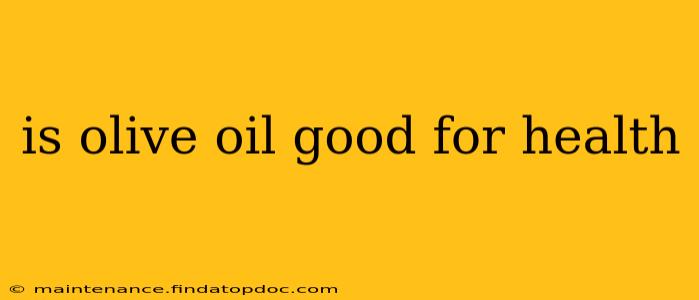Is Olive Oil Good for Health? A Deep Dive into the Benefits and Drawbacks
Olive oil, a staple in Mediterranean cuisine, has garnered significant attention for its potential health benefits. But is it truly as beneficial as it's often touted to be? The answer, as with most things concerning health, is nuanced. While olive oil offers a wealth of advantages, understanding its potential drawbacks and proper usage is crucial. This comprehensive guide explores the health aspects of olive oil, addressing common questions and concerns.
What are the health benefits of olive oil?
Olive oil's health benefits largely stem from its high content of monounsaturated fatty acids, particularly oleic acid. This type of fat is associated with various positive health outcomes. Research suggests that regular consumption of olive oil can contribute to:
- Reduced risk of heart disease: Oleic acid helps lower LDL ("bad") cholesterol and raise HDL ("good") cholesterol, reducing the risk of heart disease and stroke. Furthermore, olive oil contains antioxidants that protect against oxidative stress, a contributing factor to cardiovascular disease.
- Improved blood pressure: Studies have shown that olive oil may help lower blood pressure, another significant risk factor for heart disease.
- Reduced inflammation: Olive oil possesses anti-inflammatory properties, which can benefit individuals suffering from chronic inflammatory conditions.
- Better blood sugar control: Some studies indicate that olive oil may improve insulin sensitivity and help regulate blood sugar levels, potentially beneficial for people with type 2 diabetes.
- Protection against certain cancers: The antioxidants in olive oil may help protect cells from damage caused by free radicals, potentially reducing the risk of certain cancers. However, more research is needed to establish a definitive link.
- Improved brain function: Olive oil contains compounds that may support brain health and cognitive function. Some studies suggest a potential link to reduced risk of Alzheimer's disease and dementia, although more research is needed to confirm these findings.
What are the different types of olive oil?
Understanding the different types of olive oil is important, as their quality and health benefits can vary. The main categories include:
- Extra virgin olive oil: This is the highest quality olive oil, produced using only mechanical means without chemical solvents or high heat. It boasts the highest concentration of antioxidants and health-promoting compounds.
- Virgin olive oil: Similar to extra virgin, but it may have slightly lower quality standards regarding acidity and sensory characteristics.
- Refined olive oil: This oil has undergone refining processes to remove impurities and improve its taste and shelf life. It generally has fewer antioxidants than virgin olive oils.
- Pure olive oil: A blend of refined and virgin olive oils.
Is olive oil good for cooking?
Yes, extra virgin olive oil is generally considered suitable for cooking, although its high smoke point (around 375°F or 190°C) should be considered. Avoid using high heat, as this can degrade the oil's beneficial compounds and potentially create harmful substances. For high-heat cooking methods like frying, refined olive oil might be a better choice due to its higher smoke point.
How much olive oil should I consume daily?
The recommended daily intake of olive oil varies depending on individual needs and overall dietary patterns. Generally, incorporating 2-3 tablespoons of olive oil into your daily diet can provide significant health benefits. Always consult with a healthcare professional or registered dietitian to determine the appropriate amount for your specific circumstances.
Is olive oil suitable for weight loss?
While olive oil is calorie-dense, it can be part of a healthy weight loss diet. Its monounsaturated fats can promote satiety, potentially reducing overall calorie intake. However, moderation is key; excessive consumption can lead to weight gain.
Does olive oil have any side effects?
While generally safe, excessive consumption of olive oil can lead to digestive issues like diarrhea or stomach upset. Some individuals may also experience allergic reactions. Additionally, olive oil is high in calories, so mindful consumption is vital for maintaining a healthy weight.
Conclusion:
Olive oil, particularly extra virgin olive oil, is a nutritional powerhouse offering a wealth of potential health benefits. Incorporating it into a balanced diet can contribute to improved heart health, reduced inflammation, and better blood sugar control. However, moderation is key, and understanding the different types and their appropriate uses is important to maximize its benefits and minimize potential drawbacks. Always consult with a healthcare professional before making significant changes to your diet, especially if you have pre-existing health conditions.
